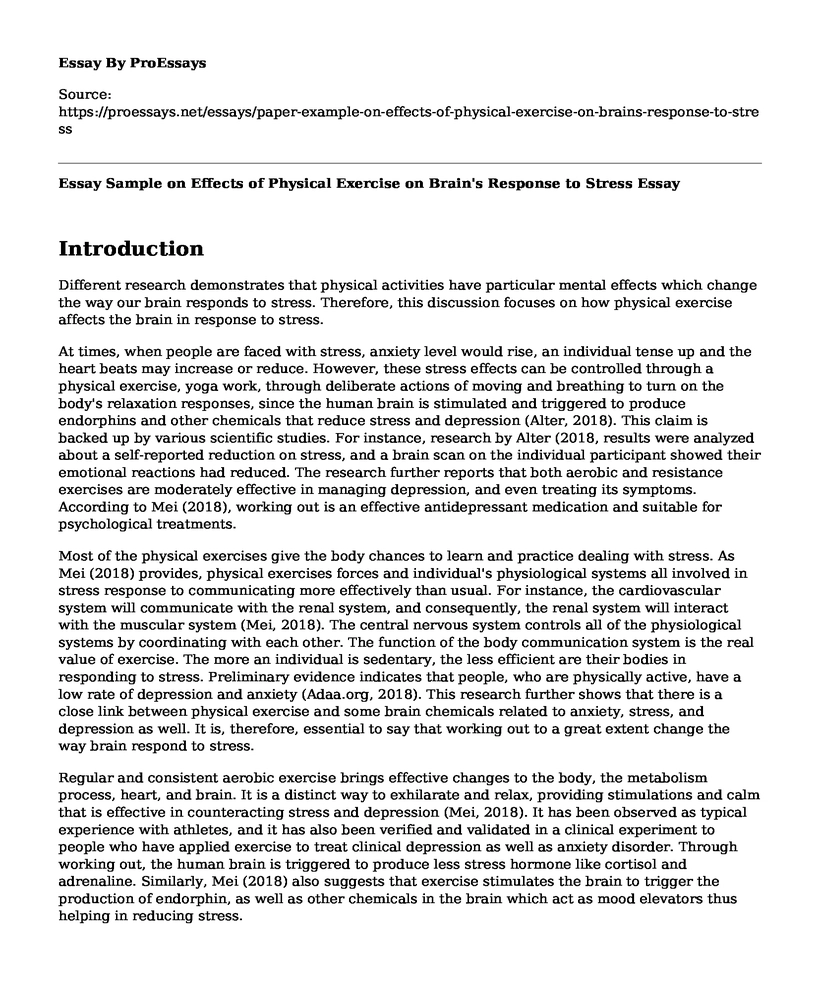Introduction
Different research demonstrates that physical activities have particular mental effects which change the way our brain responds to stress. Therefore, this discussion focuses on how physical exercise affects the brain in response to stress.
At times, when people are faced with stress, anxiety level would rise, an individual tense up and the heart beats may increase or reduce. However, these stress effects can be controlled through a physical exercise, yoga work, through deliberate actions of moving and breathing to turn on the body's relaxation responses, since the human brain is stimulated and triggered to produce endorphins and other chemicals that reduce stress and depression (Alter, 2018). This claim is backed up by various scientific studies. For instance, research by Alter (2018, results were analyzed about a self-reported reduction on stress, and a brain scan on the individual participant showed their emotional reactions had reduced. The research further reports that both aerobic and resistance exercises are moderately effective in managing depression, and even treating its symptoms. According to Mei (2018), working out is an effective antidepressant medication and suitable for psychological treatments.
Most of the physical exercises give the body chances to learn and practice dealing with stress. As Mei (2018) provides, physical exercises forces and individual's physiological systems all involved in stress response to communicating more effectively than usual. For instance, the cardiovascular system will communicate with the renal system, and consequently, the renal system will interact with the muscular system (Mei, 2018). The central nervous system controls all of the physiological systems by coordinating with each other. The function of the body communication system is the real value of exercise. The more an individual is sedentary, the less efficient are their bodies in responding to stress. Preliminary evidence indicates that people, who are physically active, have a low rate of depression and anxiety (Adaa.org, 2018). This research further shows that there is a close link between physical exercise and some brain chemicals related to anxiety, stress, and depression as well. It is, therefore, essential to say that working out to a great extent change the way brain respond to stress.
Regular and consistent aerobic exercise brings effective changes to the body, the metabolism process, heart, and brain. It is a distinct way to exhilarate and relax, providing stimulations and calm that is effective in counteracting stress and depression (Mei, 2018). It has been observed as typical experience with athletes, and it has also been verified and validated in a clinical experiment to people who have applied exercise to treat clinical depression as well as anxiety disorder. Through working out, the human brain is triggered to produce less stress hormone like cortisol and adrenaline. Similarly, Mei (2018) also suggests that exercise stimulates the brain to trigger the production of endorphin, as well as other chemicals in the brain which act as mood elevators thus helping in reducing stress.
Conclusion
Physical exercises are good for maintaining mental health, by changing the way the brain responds to stress. By working out, the brain cells are triggered to produce endorphins and other chemicals in the brain that act as a natural painkiller (Adaa.org, 2018). Similarly, physical activities enable our minds to relax, thereby improving the ability to sleep and as a result, responds positively towards the management of stress. Practices such as massage therapy, meditation, deep breath, and acupuncture can be useful in triggering the brain to produce endorphins. Through exercise, the brain is stimulated and consequently triggers the production of chemicals and hormones that reduce stress and depression rate. However, stress is inevitable in life and engaging in physical activities is a positive approach towards managing it.
References
Adaa.org. (2018). Physical Activity Reduces Stress | Anxiety and Depression Association of America, ADAA. [Online] Available at: https://adaa.org/understanding-anxiety/related-illnesses/other-related-conditions/stress/physical-activity-reduces-st [Accessed 8 Dec. 2018]
Alter, G. (2018). Overcome and Manage Stress by Exercising Daily | AlterG. [Online] Available at: https://www.alterg.com/treadmill-training-rehab/athletics/how-exercise-improves-stress-management [Accessed 8 Dec. 2018].
Mei, Z. H. A. N. G. (2016). Influence of Physical Exercise on the Mental Health and Interpersonal Relationships of Adolescents. Journal of Nanjing Sport Institute (Social Science), 5, 016.
Cite this page
Essay Sample on Effects of Physical Exercise on Brain's Response to Stress. (2022, Oct 19). Retrieved from https://proessays.net/essays/paper-example-on-effects-of-physical-exercise-on-brains-response-to-stress
If you are the original author of this essay and no longer wish to have it published on the ProEssays website, please click below to request its removal:
- Relationship Between the Counsellors and the Clients and Spirituality Paper Example
- The Connection of Health Promotion Principles to Mental Health Policies Essay Example
- Anti-Vaxers and Ethical Dilemma Essay Example
- My Interview with an Experienced Nurse Practitioner: Essay Sample
- Stigma & Mental Illness: Impacts & Discrimination - Essay Sample
- Explaining Human Error Reasoning for Mental Health Treatment - Essay Sample
- Paper Example on Compulsory Admissions of Psychiatric Patients: A Multiple-Case Study







